As omnivores, chickens eat (or try to eat) just about anything they can get their beaks on. In the yard, chickens will find a cornucopia of protein- and vitamin-rich foods on their own, including insects and grubs, vegetation, and seeds. They may even sample yard fare such as skinks, toads, or small snakes before determining that they don't like it. The chicken's diet is substantially influenced by foraging during the warmer months, but free-ranging is not required for a backyard flock to benefit from a healthy, balanced diet.
In warm or cold weather, layer feed should be the primary food for backyard chickens. Whether in pellet or crumble form, chicken feed is designed to meet the nutritional needs of laying hens so they can consistently produce well-formed eggs. In addition to protein and calcium, commercial feeds provide a range of vitamins and minerals essential for a healthy chicken.
In cold weather, when their food intake is higher and foraging is not an option, supplementing their diet is still important. Providing chickens with a nutritious diet of fruits, vegetables, and grains will keep them happy and healthy. Leafy greens (eg. kale, spinach & cabbage), cooked beans, corn, non-sugary cereals and grains, berries, apples, peaches, carrots, broccoli, cauliflower, brussels sprouts, bell peppers, squash, chard, cucumbers, pumpkins, sunflower seeds, grapes, beets and most other fruits and vegetables are all good choices for your poultry as they contain essential vitamins and minerals as well as fiber and antioxidants.
Read more about chicken treats here:
Here are some more discussions on the topic:
In warm or cold weather, layer feed should be the primary food for backyard chickens. Whether in pellet or crumble form, chicken feed is designed to meet the nutritional needs of laying hens so they can consistently produce well-formed eggs. In addition to protein and calcium, commercial feeds provide a range of vitamins and minerals essential for a healthy chicken.
In cold weather, when their food intake is higher and foraging is not an option, supplementing their diet is still important. Providing chickens with a nutritious diet of fruits, vegetables, and grains will keep them happy and healthy. Leafy greens (eg. kale, spinach & cabbage), cooked beans, corn, non-sugary cereals and grains, berries, apples, peaches, carrots, broccoli, cauliflower, brussels sprouts, bell peppers, squash, chard, cucumbers, pumpkins, sunflower seeds, grapes, beets and most other fruits and vegetables are all good choices for your poultry as they contain essential vitamins and minerals as well as fiber and antioxidants.
What Is Poisonous To Chickens?
There are some foods that should be avoided despite their voracious appetites and willingness to consume nearly anything you give them. Among the harmful or even poisonous foods for chickens are citrus fruits, avocado, uncooked beans, green potato skins/peels, green tomatoes, rhubarb leaves and apple seeds. These contain toxins such as oxalic acid, persin & cyanide.What human food can chickens eat?
Using table scraps as a source of extra nutrition for your flock and as a way to reduce food waste is easy and affordable. It is very likely that most of what you eat will also appeal to a chicken's palate, including meat scraps. You may be surprised at how much food you used to waste once you start putting scraps aside for the "girls". Avoid sharing high-sugar treats, high-fat foods, or snacks high in salt, as well as food that has gone bad and moldy. Some vegetables, such as onions and garlic, have strong flavors that can affect the taste of eggs.How Much Treats To Feed Your Chickens
In moderation. Chickens should eat 90 percent of their diet from quality commercial feed. The percentage of treats in their diet should be around ten percent. What is the reason behind this? There are enough nutrients in commercial feeds to meet the chickens' dietary requirements. So your backyard chickens should only be fed treats/scraps/snacks in small amounts due to potential obesity-related health concerns.Summary
Once chickens are included in the equation when it comes to leftovers and other treats, it can be easy to overdo it. Just as with people, moderation is key. Having a steady diet of commercial layer feed will provide chickens with the basic nutrition they need. Small amounts of "a la carte" treats such as mealworms & yogurt, and herbs such as basil can keep birds happy, providing enough variety to benefit the flock's health. Everything else is gravy. Oh, and chickens eat gravy too!Read more about chicken treats here:
- Top 50 List Of What Chickens Can & Can't Eat
- Chicken Treat Chart: The Best Treats for Backyard Chickens
Here are some more discussions on the topic:
- Feeding & Watering Your Flock Forum Section
- Topic/Question of the week—Feeding table scraps to your flock
- Topic of the Week - Feeding Treats

